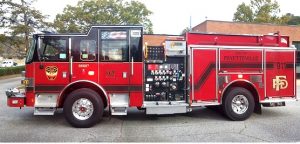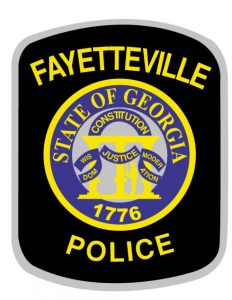They’ve been talked about a lot recently, so some young people decide to tell what they want
There has been much talk recently in Fayette County about the age group referred to as millennials. As it turns out, a group of people representing that age group wanted to have their say on what they believe and how they see their community, both now and for its future.
The age group called millennials by the U.S. Census Bureau is represented by those ages 16-34, born roughly between the early 1980s and the early 2000s.
A group of four Fayette residents recently spoke with The Citizen on the topic of millennials. They included 30-year-old Lauren Panter, who is married with two young children and lives off Grady Avenue in Fayetteville; 28-year-old Wyatt Martin, who is married with two young daughters and lives off Grady Avenue; 29-year-old Philip Shell, who is married with a 6-month child and lives in Woolsey; and 30-year-old Jennifer Jordan, who is married with a 1-year-old and lives off Redwine Road.
Three of the four grew up in Fayette County. Wyatt’s wife grew up here so they moved back. Philip and Wyatt moved here for their jobs, while Lauren came back to be close to her family. Jennifer also moved back to be close to family and opened a satellite operation from her Atlanta business.
The four were good-natured about the millennial label and took it in stride, though they wanted to provide a point of clarity.
The group said one of the problems with labels, such as “millennials,” is that they often fail to accurately portray many of the individuals assigned by society to a particular grouping.
The label called “millennials” or even “young professionals” does not accurately reflect their intention or even the reality of who they are and how they see themselves, they maintained.
“We don’t want to cling to a label. We want to cling to the values that we hold,” said Philip. “We don’t all fit those labels.”
“The word ‘millennial’ has a negative connotation,” said Lauren, voicing a concern she mentioned at a previous meeting of the Fayetteville City Council.
“We’re business owners, stay-at-home moms and working at companies,” Lauren continued, politely making the point that a label does not tell the full story of an individual or a group. “And we’re getting painted with this label.”
“We’re a community,” Phillip elaborated. “We don’t want to be cornered in a ‘group.’ We want to work with other generations. We don’t want to take over anything.”
“We want to work with others,” added Jennifer.
These four and others have recently become involved in the political life of Fayetteville, attending a number of city council, development authority and other public meetings. The group was asked how that involvement came about.
Lauren said she saw the downtown master plan story in the paper in January and learned that a public meeting would be held.
“I got the sense that the (downtown master plan) idea was negatively received,” Lauren said, noting that the audience at the meeting was populated almost exclusively by people who appeared to be 50 years old or older.
“I knew our voice needed to be heard,” she said.
It was after the meeting that Jennifer and Lauren began talking. Lauren subsequently connected with Philip and the conversation began to spread. The four sitting at the table last week said they began to realize that “a voice needed to be formed.”
The four later attended the Fayette Forward event at Pinewood Atlanta Studios, which focused on the need to bring people of their age group to Fayette County. From there the word went out and nearly 50 people soon met at Truett’s Luau restaurant on Grady Avenue to continue the conversation.
“I was surprised at the excitement,” Philip said on his take from the meeting.
Jennifer said it wasn’t just married people at the meeting at Truett’s. Many were single, she added.
Downtown master plan notwithstanding, the group was asked a simple question: Why get involved?
Lauren explained by remaining silent the age group would be essentially giving their consent to whatever transpires in the future.
For Philip, the idea is that many of those in their age range grew up in Fayette County and “we want that for our families.”
Jennifer agreed, adding, “We’re living our lives. We want to help create the culture of a town that has things happening. Some things already are, and we’re hoping it will be a thriving place, a place to stop and be and hang out with friends.”
Wyatt in his comments expanded on the idea of “culture.”
“The culture we want to see is not something one entity (or one business) is going to create. And it’s not a strip shopping center or an outlet mall. It’s a community,” he said.
“A community where you can walk down the street,” Jennifer added.
It is human interaction, Philip and Wyatt said, extending the conversation.
“It’s life slowing down a bit,” Wyatt added.
What is desirable, Jennifer noted, is a community where people can live, work and play.
“I’ll give up yard space for community all day long. I would love not to have to see my car for a month,” Wyatt said.
The conversation ended with a generalized message, arrived at by consensus.
“Our hope for Fayette County is to create a future that unifies people, exemplifies our history and amplifies a culture, establishing a community that all generations desire.”
Though some in the “millennial” age group may be “too young” to know, what they describe is what some of their parents and many of their grandparents had when they were young: a hometown where the parents and kids could walk to town to meet friends, do some shopping or have a meal.
Truth be known, that is the reason some Fayette residents have moved to Senoia. Such was the case with Susan and Evan Stitt, Peachtree City residents who purchased Southern Living Magazine’s 2012 Idea House on the Gin Property.
“We loved Peachtree City, but here we can walk to downtown restaurants and shops and events. And we can still use our golf cart,” Evan said with a smile.












Leave a Comment
You must be logged in to post a comment.